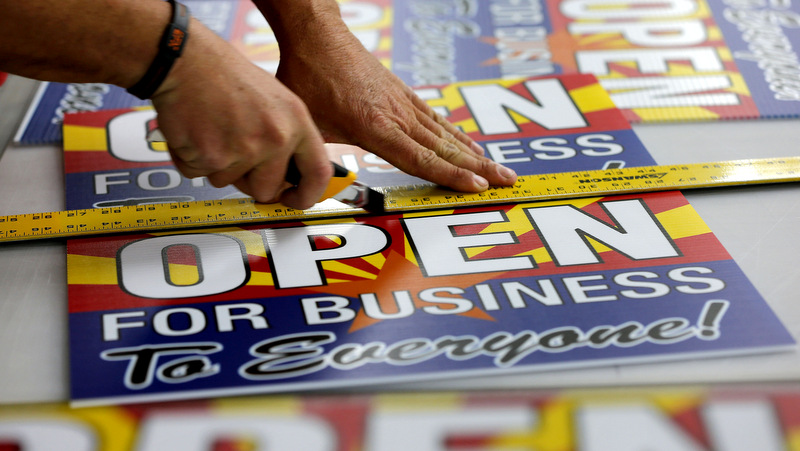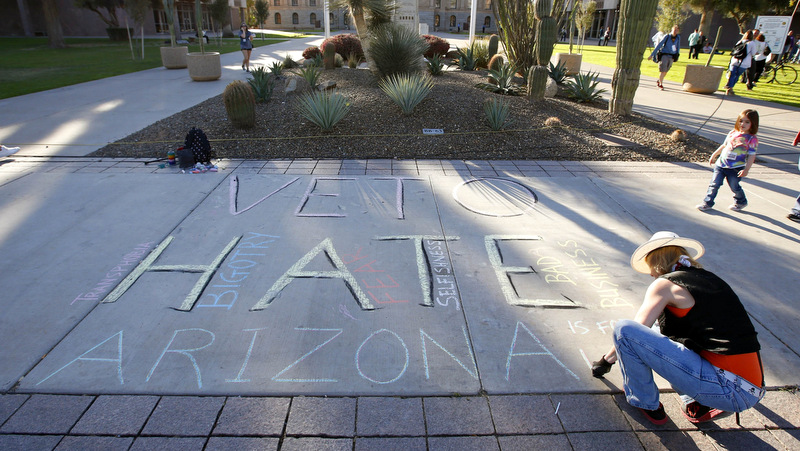
Wednesday’s announcement that Gov. Jan Brewer has vetoed Arizona Senate Bill 1062 brought a sense of relief to many. The controversial bill, which would have allowed businesses to use religious beliefs as a reason to deny services to people, was seen as an open-handed attempt to legally justify bigotry toward the LGBT community.
The bill would have protected a business a discrimination lawsuit if the decision to deny service was based on “sincerely held” religious beliefs and providing a service would create an undue burden on the holder of those beliefs.
The Arizona bill, which was passed by the Arizona State Legislature last week, sparked an immediate and unrelenting wave of backlash from LGBT supporters, civil liberty advocates, the business community and even the Republican Party. Both of the state’s U.S. senators, John McCain (R) and Jeff Flake (R), roundly denounced the bill. Former Republican presidential candidate Mitt Romney and three state senators who had voted for the bill’s approval also called for the veto.
Despite the Arizona defeat, the strategy of using religious liberty as a justification for attacking gay rights seems to be alive and well elsewhere. In nearly a dozen states, laws similar to Arizona’s have been considered, are currently being considered or have been proposed.
Business considerations
The potential economic fallout facing the state if the bill were signed into law is likely what prompted Brewer’s veto. National companies such as American Airlines, Apple, AT&T, Delta Airlines, Intel, Marriott, PetSmart, Starwood and Yelp — many of which have non-discrimination policies, all reached out to the governor in opposition of the bill.
Next year’s Super Bowl, scheduled to be played in Arizona, was allegedly in danger of being relocated because the NFL showed distress with the consideration of the legislation.
The Hispanic National Bar Association announced it will relocate its convention, which had been scheduled to be held in Phoenix in September, due to SB 1062.
Barry Broome, president & CEO of the Greater Phoenix Economic Council, indicated in a letter to Brewer prior to her veto announcement that four companies that were considering expansions in Arizona were considering cancelling their plans unless a veto was achieved.
Arizona has been slower than most states in recovering from the Great Recession, and a major business boycott would be a huge setback for the state.
Moreover, as far as Republican politicians are concerned, the business sector is the Republicans’ primary campaign backer. The notion of a business boycott just before the 2014 midterm elections could be disastrous for the GOP in Arizona, where no front-runner has emerged yet in the 2014 gubernatorial race.
“Senate Bill 1062 does not address a specific or present concern related to religious liberty in Arizona,” Brewer said in a statement. “I have not heard one example in Arizona where a business owner’s religious liberty has been violated.”
She further criticized the bill as a broadly worded proposal that “could result in unintended and negative consequences.”
“I understand that long-held norms about marriage and family are being challenged as never before,” Brewer added. “I sincerely believe that Senate Bill 1062 has the potential to create more problems than it purports to solve. It could divide Arizona in ways we cannot even imagine and no one would ever want.”
Outlawing love
Like Arizona, Idaho, Georgia, Kansas, Maine, Mississippi, Missouri, Nevada, Ohio, Oklahoma, Oregon, South Dakota, Tennessee and Utah have experimented with “religious liberties” bills.
Though Arizona is the only state that has passed one of these bills, it is clear that these bills were created in response to recent federal court decisions. The Arizona bill, which was sponsored and pushed for by the Center for Arizona Policy, a socially conservative anti-gay marriage and anti-abortion rights group, suggested that the bill clarifies existing state laws and provides a hedge against “activist” federal courts.
In Colorado, a state judge ruled that a baker who refused to sell a wedding cake to a gay couple was acting discriminately. In New Mexico, the state Supreme Court ruled that a lawsuit against a photographer that refused to photograph a commitment ceremony was permittable. Along with the current rash of anti-gay marriage state laws being overturned by the federal courts — the latest being Texas — conservative lobbyists are desperate to slow the equal rights movement.
“The core purpose is to protect clergy, faith communities, individuals from being compelled by law or government to participate in a wedding ceremony,” Brian Walsh, executive director of the American Religious Freedom Program, said of the religious freedom bills. “I just don’t know anybody influential in the religious freedom arena who thinks that you should [be] giving people some type of pocket veto not to provide services to people based on their sexual orientation in general public accommodations.”
The Arizona legislation has also been backed by Focus on the Family, which was founded by the evangelical Christian author and talk radio host James Dobson, Al-Jazeera reported. The pieces of legislation in Idaho and Tennessee are also backed by Focus of the Family. The Kansas legislation is backed by the American Religious Freedom Project, which is part of Edward Whelan’s Ethics and Public Policy Center. Whelan served in the Reagan administration and currently writes on legal affairs for the National Review.
The trend of conservative lobbyists opposing the LGBT community doesn’t seem to be waning. On Monday, Washington-based lobbyist Jack Burkman announced that he is preparing legislation that would ban gay athletes from joining the NFL. ”We are losing our decency as a nation,” Burkman said in a statement. “Imagine your son being forced to shower with a gay man. That’s a horrifying prospect for every mom in the country. What in the world has this nation come to?”
Burkman said that there is political support behind the legislation. However, considering the NFL’s strong response against SB 1062, Burkman’s bill is unlikely to be considered.
Burkman’s bill is in reaction to college football player Michael Sams’ announcement that he is gay. If drafted, Sams would be the first openly-gay player in the NFL.
Status of “religious liberties” bills in other states
Arizona SB 1062 is heading back to the state Legislature to see if Brewer’s veto will be overturned. Current indications suggest Brewer’s veto will stand.
Idaho House Bill 426, which would prevent the denial or revocation of a professional or occupational license for employment or denial of service decisions made based on religious beliefs, has been sent back to committee. As the Idaho State Legislature adjourns in March, the bill is effectively dead.
Georgia’s bill, which would offer immunity to discrimination lawsuits based on “religious liberties,” appears stalled for the remainder of the legislative session.
A Kansas resembles Arizona SB 1062, but expands it by establishing its exemption around “sincerely held religious beliefs of the individual or religious entity regarding sex or gender.” This would give businesses the right to deny service or employment benefits to any couple, straight or gay, that the business disagrees with. It is currently stalled in the state Senate, but its passage is likely to be re-attempted in the future.
Similar to Kansas’ bill, Missouri’s bill only has a single sponsor and does not currently have enough support to get it pushed through the legislature.
Nevada’s bill, which would prevent the state government from “substantially burdening” a person’s “exercise of religion,” is currently dead.
Ohio’s House Bill 92, which would create a general exemption for “religious employers” from state discrimination laws on the basis of “race, color, religion, sex, military status, national origin, disability, age, or ancestry,” didn’t make it past its introduction.
Oklahoma’s bill is currently being rewritten based on the outcry from Arizona.
The bill in Oregon, which would exempt business owners from LGBT discrimination lawsuits, is being pushed for approval to appear on the state ballot this year as a voter initiative.
The bills in South Dakota, Tennessee, Mississippi and Maine are all dead, for now, and Utah has yet to introduce its bill.


